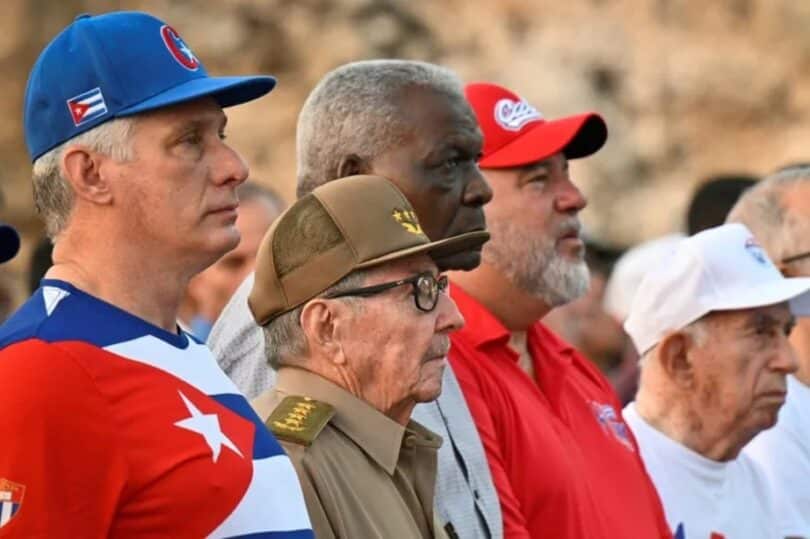An Agence France-Presse article (“Communist Cuba celebrates Worker’s Day, four days late”) from May 5, 2023, reported that “Cuba finally celebrated May Day on Friday, four days late, after the original celebration of workers was postponed due to the risk of rain and trimmed down as a result of a fuel shortage. The May 1 celebration is usually a grandstand event in the communist island nation.”
According to the report, thousands of people from all over the country usually descend on the capital by bus to congregate at Revolution Square before beginning a parade. This year, however, Havana residents were asked instead to head to the parade on foot along the iconic Malecón promenade, while smaller festivities were organized in other neighborhoods. The only buses to bring workers to the event came from nearby municipalities. Rather than putting on a massive commemoration in the central square, which marks the highest point in the city, a more low-key celebration took place by the coast.
The report explained that “a fuel shortage lasting more than a month has greatly complicated the daily lives of ordinary Cubans. Even President Miguel Diaz-Canel and his wife Lis Cuesta walked to the promenade to take part in the ‘revolutionary reaffirmation,’ alongside his predecessor Raul Castro.” The article went onto cite Ulises Guilarte de Nacimiento, the general secretary of the Workers’ Central Union, the trade union federation in Cuba: “This change of location is consistent with the current limitations on fuel insurance as part of the complex economic situation our country is going through.”
The article asserts that Cuba is suffering its worst economic crisis in three decades, exacerbated by the pandemic, the war in Ukraine, and U.S. sanctions. These have left the country with frequent shortages of food, medicine, and fuel, and soaring inflation.
Today, the May Day March in Havana is a symbol of reassertion—a reassertion of the class position of the working class in humanity’s historical march toward a society free of exploitation and injustice, and against finance capital, imperialism, and retrogressive ideas.
This journey, as like all of humanity’s past journeys, is not without its challenges and setbacks. In a world dominated by imperialism, the working classes’ march forward isn’t easy, doesn’t move along a straight line.
Setbacks aren’t declarations of defeat. Problems aren’t signatures of failures. Fault lines in bases don’t mean a shooting down of the working classes’ march for equity and equality. Scholars and propagandists pointing to problems in Cuba deny imperialism’s suffocating sanctions imposed on the country.
These scholars and propagandists never detail the realities of exploitation, deprivation, and inequality. They never cite corruption and injustice in countries dominated by exploiting interests. They never go into the corrupt political systems and exploiting production relations.
The scholars and pundits never compare Cuba and the most advanced capitalist countries using a sound methodology. This would have required (1) a historical perspective, (2) an understanding of classes, with their origins, experiences, and command over resources, and (3) systemic hurdles. Even a comparison between the funds allocated for carrying out subversive activities and negative propaganda against Cuba, and the budget of any Cuban ministry will expose how imperialism is constantly battling Cuba.
Let’s take an example from very recent developments in countries with capitalist economies: European countries imposed unprecedented sanctions against Russia. And what has happened with the powerful capitalist economies in Europe? The energy crisis they are facing? What advice was given to their citizens? Were they not to consume less energy? Was not, at least in one European country, fuel wood rationed? Was not collecting wood from forests prohibited? Didn’t an underground market for coal from abandoned pits emerge? How did big capitalist countries collect fuel after sanctions were imposed on Russia? Has not at least one big capitalist country been exempted from buying fuel from Russia? Aren’t big capitalist economies in Europe buying fuel from African and Asian countries, which are buying that oil (mainly diesel) from Russia? People in at least one European big country have been told to cut down on breakfast. The list goes on and on. Yet, the mainstream media hardly ever reports these stories. But Cuba’s oil problem is widely publicized. And even then, it’s a story told only partially: The imperialist sanction behind the oil scarcity is not mentioned. It is just said that the central May Day celebration in Havana has been cancelled.
Do the mainstream scholars and propagandists talk about Cuba’s defiance in the face of imperialist economic and financial blockade, and its consequences on the life of the people of Cuba? They don’t dare to tell this truth. They don’t dare to speak about the courageous Cuban people’s dignified stand. They don’t dare to speak about the Cuban people’s struggle to build an exploitation-free society. They don’t dare to spread this message: Cuba is an example in people’s struggle for a democratic, dignified, and just society.
But the working peoples around the world salute the Cuban people as they continue their courageous fight.

